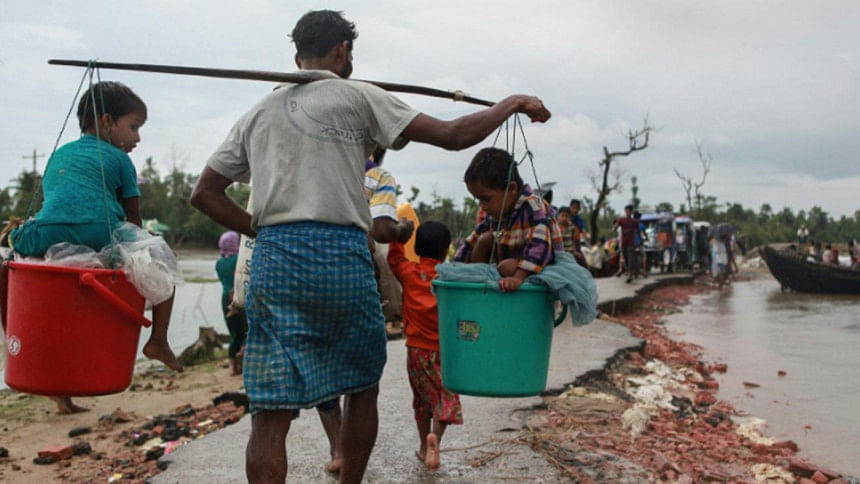200,000 Rohingya children at risk in Bangladesh camps: Unicef

More than 200,000 Rohingya children who have fled to Bangladesh from Myanmar are at incredible risk and they need urgent support, Unicef said today.
This is a growing humanitarian crisis and children are at the heart of this crisis. Sixty percent of all refugees are children, according to preliminary data, Jean Lieby, chief of Child Protection of Unicef Bangladesh, said at a press briefing in Cox's Bazar.
"We believe that 200,000 Rohingya children need our urgent support. These children are at the forefront of this humanitarian crisis. They are at incredible risk", he said.
"The first thing you see here in the different Rohingya camps is the large number of children. You see children who have not slept for days, they are weak and hungry. After such a long and challenging journey many children are sick and they need health care right away. Children are traumatized. They need protection and psychological support. We also see pregnant mothers and we know that many babies were born since their mothers' arrival in Bangladesh", he said.
He has also expressed deep concern for the separated children. "We have identified 1,128 children who are separated. However, we expect this number to increase a lot in the coming days", he added.
Meanwhile, humanitarian agency World Vision says that it cannot access the thousands of children and families caught up in the violence that broke out in Myanmar's Rakhine state.
"Two weeks ago, we were reaching more than 20,000 people with food, including 7,000 young children in Myanmar. Today, we are reaching none. The violence has displaced children, families, our own staff and is preventing us from reaching those most in need," the World Vision International's Trihadi Saptoadi, global head of programming and emergency affairs, said in a press release.
13% refugee women in need of emergency maternal care
At least 13 percent of the Rohingya women fleeing violence in Myanmar's Rakhine state are either pregnant or lactating mothers who need life-saving maternal and newborn health care services, said UN Population Fund (UNFPA) today.
The finding, based on an assessment among the 128,000 new arrivals by the Inter-Sector Coordination Group, was published today.
"Women do not stop getting pregnant or having babies just because an emergency hits," noted Iori Kato, acting representative of UNFPA Bangladesh that works on reproductive health and gender development.
It sought an emergency fund of US$ 13 million for reproductive health and gender-based violence response for Rohingya women and girls arriving from Myanmar to Bangladesh.
"As in any humanitarian emergency, the risk of gender-based violence increases significantly as well putting women and girls at heightened risk," he said.
"Among the UN family, UNFPA takes the lead for sexual and reproductive health as well as gender-based violence response, a responsibility we take very seriously."
UNFPA has already deployed midwives trained in humanitarian response to complement midwives and other personnel who were already serving in Cox's Bazar.
These midwives are attending to the medical needs of the pregnant women, mothers and their newborns, delivering babies and providing emergency obstetric care.
They are also looking after survivors of sexual violence as necessary, utilising their expertise in the clinical management of rapes.
"The magnitude of these needs is immense, and growing," noted UNFPA's Iori Kato.
"Now, more than ever, we must be able to scale up our life-saving interventions to meet them." he said.

 For all latest news, follow The Daily Star's Google News channel.
For all latest news, follow The Daily Star's Google News channel. 



Comments